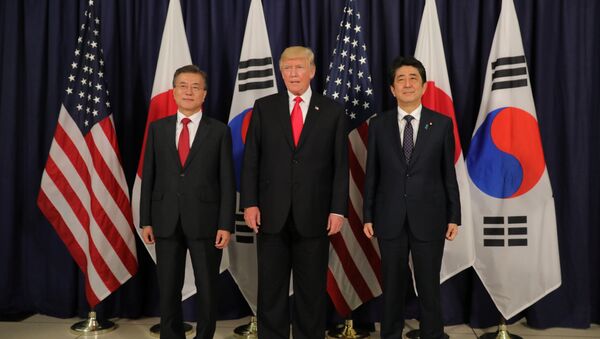During the course of the G20 summit of world leaders, the US president met with Japanese Prime Minister Shinzo Abe and assured him that Beijing and Washington fully intended to address the "the problem and menace of North Korea."
"Something has to be done about [North Korea]," Trump was quoted as saying in a separate meeting with Chinese President Xi Jinping, notably in light of a Pyongyang's launch of its first intercontinental ballistic missile, cited by Stripes.com.
Abe affirmed that the lack of stability in the region had become "increasingly severe" following the first launch of a North Korean ICBM thought to be capable of striking targets on the US mainland.
Abe's affirmation to "demonstrate the robust partnership as well as the bonds" between Tokyo and Washington came after a bilateral meeting with Trump on Saturday on the sidelines of the G20 financial markets summit in Hamburg, Germany.
The regional keystone in mitigating the threat posed by North Korea is seen to be the willingness of China to increase pressure on the increasingly isolated northern country, and Trump has remarked on his administration's frustration with Beijing's willingness or ability to support the US position on the rogue nuclear power.
Prior to the G20 summit, Trump tweeted, "So much for China working with us — but we had to give it a try!"
The meeting between Trump and Xi was said to be productive, however, as the US president was quoted as telling Xi, "I appreciate the things that you have done relative to the very substantial problem that we all face in North Korea," cited by Stripes.com
But China's approach to the problem of North Korea has consistently been shown to be at odds with that of the US, as US Secretary of State Rex Tillerson on Friday rejected an offer by Beijing and Moscow to first end Washington's military drills with Seoul prior to starting negotiations with Pyongyang to end its ballistic missile testing.
Referring to the offer as a "freeze for freeze," Tillerson asserted that Washington was unwilling to begin negotiations with Pyongyang at its current level of nuclear and ballistic missile development, according to Yonhap.
"The problem with freezing now," Tillerson said, is "if we freeze where they are today, we freeze their activities with a very high level of capability. And we do not think it also sets the right tone for where these talks should begin."
The US instead is looking to approach negotiations with Pyongyang as a "cease and roll back" program, the secretary of state said, according to Stars and Stripes.
Acknowledging that the current negotiation stance toward Pyongyang by Russia, China and the US has not yet been delineated, Tillerson suggested that Xi and Russian President Vladimir Putin view the so-called menace of the North Korea, "a little differently than we do."



